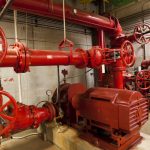Commercial Fire Pumps: The Vital Components of Fire Protection Systems for Large-Scale Buildings
Fires can be detrimental to any kind of property. If not detected and extinguished at the earliest, they can wreak havoc on property and human lives. Therefore, having a proper fire protection system is essential for all kinds of buildings, especially large-scale buildings that house hundreds or thousands of people. And one of the most vital components of a fire protection system is a commercial fire pump. In this blog post, we will discuss commercial fire pumps and their importance in keeping buildings safe from fires.
What is a commercial fire pump, and how does it work?
A commercial fire pump is a device that provides water pressure to fire sprinkler systems. Its primary function is to supply water to the sprinkler heads in the event of a fire. Fire pumps are typically installed in the basement or on the ground floor of the building and are designed to work automatically. When the system detects a fire, the fire alarm sounds, and the fire pump starts to pump water into the sprinkler system. The water then flows through the pipes and out of the sprinkler heads, which helps to extinguish the fire.
Fire pumps are powered by electricity, diesel, or steam. Electrically powered pumps are the most common and are typically connected to the main electrical supply of the building. Diesel-powered pumps are used as a backup in case of power failure. Steam-powered pumps are rarely used these days due to their high cost and maintenance.
Types of Commercial Fire Pumps
There are mainly two types of commercial fire pumps: horizontal and vertical. Horizontal fire pumps are the most common and are generally used in applications where space is not an issue. They are less expensive to install and maintain than vertical pumps.
Vertical pumps are used in situations where space is limited. They are more compact than horizontal pumps and can be easily installed in areas such as high-rise buildings. They are more expensive than horizontal pumps but offer many benefits.
An additional classification of fire pumps is split-case and end-suction fire pumps. Split-case pumps are ideal for larger applications, such as airports and industrial buildings. They offer excellent efficiency and are easy to repair and maintain. End-suction pumps are more commonly used in small to medium-sized buildings such as schools and offices.
Importance of Commercial Fire Pumps
Commercial fire pumps play a crucial role in fire protection systems. They ensure that the water pressure in the sprinkler system is adequate to extinguish flames effectively. Without a fire pump, the sprinkler system would fail to function correctly, and the fire could spread rapidly, resulting in damage and loss of life.
Fire pumps provide constant water pressure to the sprinkler system, ensuring that the water reaches all areas of a building. This is especially important in large-scale buildings where the fire could be localized in one part of the building but still pose a threat to the entire structure.
Another crucial function of commercial fire pumps is that they can be used to supplement a fire department’s water supply. In situations where there is not enough water pressure or volume available from the municipal supply, fire pumps can provide additional water to the system. This can be crucial in saving properties and lives in the event of a fire.
Conclusion
Commercial fire pumps are a vital component of any fire protection system in large-scale buildings. They provide water pressure to the sprinkler system, ensuring that the water reaches all areas of the building. They also act as a backup water source for the fire department. Without commercial fire pumps, a fire protection system is incomplete and ineffective. If you are responsible for the safety and protection of a large-scale building, it is crucial to ensure that the fire pump is in proper working order and well-maintained. An annual inspection and maintenance of the fire pump is necessary to ensure that it continues to function correctly in the event of a fire.
